For over half a century, Colombia’s civil conflict has devastated the country, taking the lives of tens of thousands of Colombians and subjecting millions more to violent crimes. 2016 marked a turning point in this conflict—the Colombian government signed a historic peace accord with the Revolutionary Armed Forces of Colombia (FARC). The agreement led to the creation of the Commission for the Clarification of Truth, Coexistence, and Non-Repetition, which aimed to uncover the reality of the conflict. As an advisor to the commissioners and the commission’s president, graduate student Esteban Morales Herrera (CLAS’24) helped realize this goal, and he brings his strong commitment to peacemaking to his research at SFS.
A Personal History of Peacemaking
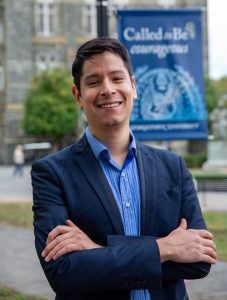 Born in Cali, Colombia, Morales Herrera has always had a close look at the violence that plagued his home country as a result of the civil conflict. Growing up, his family witnessed several acts of violence committed by the FARC guerrillas and paramilitaries in Caldas, and throughout his time in high school he witnessed the brutal fallout of attempts to control narcotics trafficking in Cali. At just 12 years old, he was part of a group of child peacemakers, meeting with human rights defenders and training to resolve conflicts. Since then, his commitment to peacemaking and pursuing justice has only grown stronger. At SFS, he has built on these experiences through his research on transitional justice theory.
Born in Cali, Colombia, Morales Herrera has always had a close look at the violence that plagued his home country as a result of the civil conflict. Growing up, his family witnessed several acts of violence committed by the FARC guerrillas and paramilitaries in Caldas, and throughout his time in high school he witnessed the brutal fallout of attempts to control narcotics trafficking in Cali. At just 12 years old, he was part of a group of child peacemakers, meeting with human rights defenders and training to resolve conflicts. Since then, his commitment to peacemaking and pursuing justice has only grown stronger. At SFS, he has built on these experiences through his research on transitional justice theory.
In his role at the Commission for the Clarification of Truth, Coexistence, and Non-Repetition, Morales Herrera worked alongside commission chair Father Francisco de Roux, visiting fellow with the Georgetown Americas Institute and a Colombian Jesuit priest, economist and philosopher. Morales Herrera listened to victims’ testimonies and participated in dialogues between victims and perpetrators. The Commission’s final report, “There is Future if There is Truth,” compiled accounts from every corner of Colombia, including victims, businessmen, human rights organizations, women social leaders, military forces and perpetrators.
“The main finding is that without incorporating the voices of victims when considering just solutions, a strong democracy cannot be built,” Morales Herrera says. “We cannot build long-standing and durable peace without centering our focus on the victims.”
The Long Road to Justice
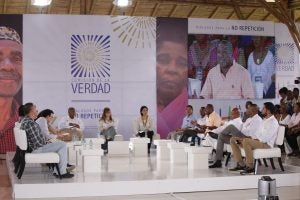
Of course, arriving at these findings was not easy. Throughout the process, the commission encountered resistance from the government and perpetrators. On top of that, the COVID pandemic hampered efforts to build trusting and safe environments for victims of marginalized communities to tell their stories. Despite these challenges, the commission’s work has continued to have an impact on Colombia and the world.
“Inside Colombia and outside, there has been an enormous interest to learn from our insights, methodology and findings,” Morales Herrera says. Still, the same challenges the commission struggled with in Colombia continue to slow progress. “Sadly, we are living in times when the negotiated and peaceful solutions of conflicts around the world are not in the politicians’ priorities. Unfortunately, those decisions are generating victims everywhere. We hope, in the near future, the transitional justice mechanisms may heal all the suffering that is happening right now in the world,” he adds.
Colombia and Beyond
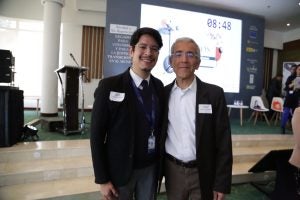
While Morales Herrera is deeply passionate about his work in Colombia, he also hopes to see the work of the commission applied around the world. His time at SFS has been instrumental in broadening his view and encouraging him to pursue transitional justice outside of his home country.
“SFS is opening my eyes beyond my Colombian-centered work, probably to other places that will do Truth Commissions to help the victims. Transitional justice is an opportunity to negotiate and help ongoing conflicts. Georgetown is opening my perspective to the world,” he says. “The environment of the SFS has strengthened my voice and taught me the importance of first being a solid scholar of transitional justice and a peacebuilder to heal our wounded world.”
A Spiritual and Scholarly Approach
Morales Herrera uses Georgetown’s Jesuit values as a guiding force in his work. Magis, the Ignatian ideal of pushing one’s self to reflect on their feelings, experiences and significant relationships, as well as utraque unum, Georgetown’s motto of “both and one,” have directed Morales Herrera in his time at SFS.
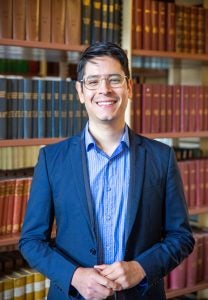
“With the extraordinary SFS community of professors that I met in my classes, in all the conversations after classes (I always have a bunch of questions, I hope they forgive me!), office hours or with a good Colombian coffee, I realized that the magis in the academic universe is key to developing your own voice,” he explains. “Also, the utraque unum tells me about something that I am learning right now, knowledge is a collaborative-communal process. I likewise believe that leadership is not just about me, however, it’s about building bridges together, as the great Professor Marc Chernick did. I want to be a leader that opens full room for all the light of my academic community to collaborate on justice and peacebuilding.”
This affinity for Georgetown’s Jesuit identity has also opened Morales Herrera up to new communities on the Hilltop.
“My favorite part of my time at Georgetown is singing in Dahlgren Chapel with music ministry. For sure, I’m the least gifted in our extraordinary choir. But there I am genuinely happy. My source of hope, meaning and growth has been in Dahlgren Chapel because of my friends in the contemporary choir and music ministry. Every time we sing together, I experience the infinite source of peace, joy, service, thinking and community,” he says.
A Brighter Future for Colombia
Looking ahead, Morales Herrera wants to see Colombia use the work of the commission to build a society that is more compassionate to victims.
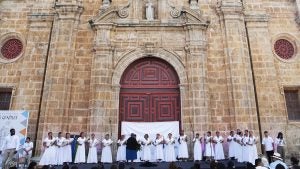
““I want to see all of those who were responsible for direct crimes to have enough courage to accept they are guilty and start to contribute to the truth: more former FARC guerrilla members, former paramilitaries, politicians, businessmen, and narcotraffic leaders. I hope to see a reconciled country where we don’t build polarized narratives, where the one who is different from me is not my enemy. And I want to see my country exercise a collective effort to dignify all the victims who suffered in this 60-year conflict. We should build statues for them because they are heroes, they suffered unspeakable crimes and they suffered our indifference as a country. They deserve empathy and a warm embrace from the whole of society. And we as a society have a commitment to make peace and to guarantee for new generations that what happened to those victims does not happen again,” he says.
As he works towards this goal, he continues to build his skills as a thinker, a researcher and a collaborative scholar with a commitment to reality.
“SFS showed me that we are not leaders ourselves alone, that we can do things together as a community of leaders, we are not starring alone but together we are called to be a constellation that shines together. The problems we are facing right now in the world require us to work together. We benefit from the creativity, sensitivity, compassion, and intelligence of others. We have to see who is around us and work together collectively to heal all the suffering that is around us and build a peaceful world,” he says. “We are broken and only seeking truth will start a genuine healing!”